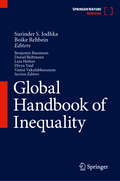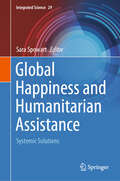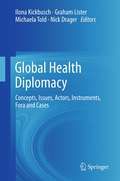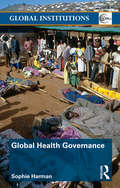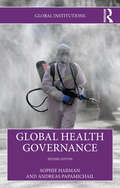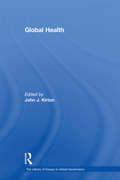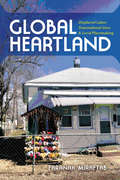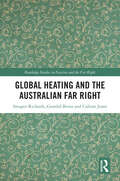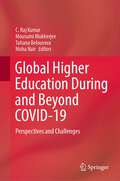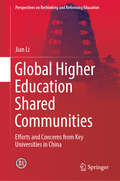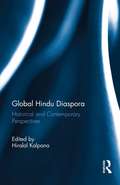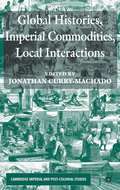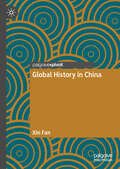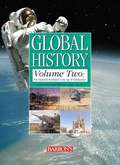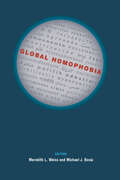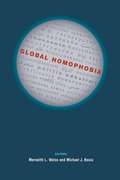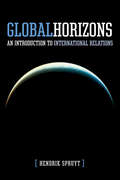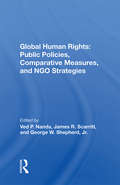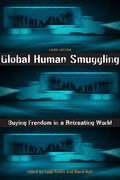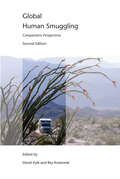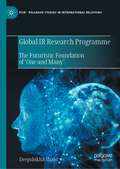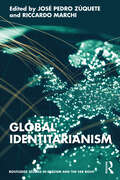- Table View
- List View
Global Guyana: Shaping Race, Gender, and Environment in the Caribbean and Beyond
by Oneka LaBennettExposes the global threat of environmental catastrophe and the forms of erasure that structure Caribbean women’s lives in the overlooked nation of GuyanaPreviously ranked among the hemisphere’s poorest countries, Guyana is becoming a global leader in per capita oil production, a shift which promises to profoundly transform the nation. This sea change presents a unique opportunity to dissect both the environmental impacts of modern-world resource extraction and the obscured yet damaging ways in which intersectional race and gender formations circumscribe Caribbean women’s lives.Drawing from archival research and oral history, and examining mass-mediated flashpoints across the African and Indian diasporas—including Rihanna’s sonic routes, ethnic conflict reportage, HBO’s Lovecraft Country, and Netflix’s Indian Matchmaking—Global Guyana repositions this marginalized nation as a nexus of social and economic activity which drives popular culture and ideas about sexuality while reshaping the geopolitical and literal topography of the Caribbean region. Oneka LaBennett employs the powerful analytic of the pointer broom to disentangle the symbiotic relationship between Guyanese women’s gendered labor and global racial capitalism. She illuminates how both oil extraction and sand export are implicated in a well-established practice of pillaging the Caribbean’s natural resources while masking the ecological consequences that disproportionately affect women and children.Global Guyana uncovers how ecological erosion and gendered violence are entrenched in extractive industries emanating from this often-effaced but pivotal country. Sounding the alarm on the portentous repercussions that ambitious development spells out for the nation’s people and its geographical terrain, LaBennett issues a warning for all of us about the looming threat of global environmental calamity.
Global Handbook of Inequality
by Boike Rehbein Surinder S. JodhkaThis handbook provides the most up-to-date and comprehensive review of the literature on inequality. It provides comprehensive overviews of the main theoretical traditions, concepts, dimensions, methodologies and contemporary debates around inequality as well as outlines of the situation of inequality in the world regions. Each entry covers the most relevant literature on the respective topic and gives an introduction to the key discussions. This authoritative reference work includes contributions from established and upcoming scholars based all over the world, and is truly global in perspective. It serves as a first introduction to the study of a particular field or issue related to inequality. The distinctive aspect of this handbook is its emphasis on the lived realities of inequality, its relational and cultural aspects, as well as the economic and quantitative aspects. This is a must-read reference volume for students, researchers and professionals interested in thistopic across the spectrum of the social sciences.
Global Happiness and Humanitarian Assistance: Systemic Solutions (Integrated Science #29)
by Sara SpowartThis book compiles concerning important solutions for current and future global challenges to wellbeing. The purpose of this book is to provide high-level, systems-thinking solutions to many relevant issues. Specifically, the most relevant identified concerns of depression, suicidal ideation, loneliness and isolation as identified by the World Organization are addressed. Other important topics that are addressed are global happiness, humanitarian challenges, physical health innovations, cultural norms and innovative solutions to improve well-being such as mental health literacy and reduced mental health stigma. This book is unique because it addresses health and wellbeing on a systems-based, solution and future-oriented perspective. A systems-based compilation of chapters is needed to improve well-being and address WHO concerns going forward. This systems-based approach should address a convergence of grassroots as well as large-scale concerns.
Global Health Diplomacy
by Nick Drager Ilona Kickbusch Michaela Told Graham ListerThe world's problems are indeed world problems: social and environmental crises, global trade and politics, and major epidemics are making public health a pressing global concern. From this constantly changing scenario, global health diplomacy has evolved, at the intersection of public health, international relations, law, economics, and management--a new discipline with transformative potential. Global Health Diplomacy situates this concept firmly within the human rights dialogue and provides a solid framework for understanding global health issues and their negotiation. This up-to-the-minute guide sets out defining principles and the current agenda of the field, and examines key relationships such as between trade and health diplomacy, and between global health and environmental issues. The processes of global governance are detailed as the UN, WHO, and other multinational actors work to address health inequalities among the world's peoples. And to ensure maximum usefulness, the text includes plentiful examples, discussion questions, reading lists, and a glossary. Featured topics include: The legal basis of global health agreements and negotiations. Global public goods as a foundation for global health diplomacy. Global health: a human security perspective. Health issues and foreign policy at the UN. National strategies for global health. South-south cooperation and other new models of development. A volume of immediate utility with a potent vision for the future, Global Health Diplomacy is an essential text for public health experts and diplomats as well as schools of public health and international affairs.
Global Health Governance (Global Institutions)
by Sophie HarmanIn the light of scares about potential pandemics such as swine fever and avian flu, the issue of global health and its governance is of increasing concern to scholars and practitioners of medicine, public health, social work, and international politics alike. Providing a concise and informative introduction to how global health is governed, this book: Explores the various ways in which we understand global health governance Explains the "nuts and bolts" of the traditional institutions of global health governance, highlights key frameworks and treaties and their relative successes and failings Examines the actors in global health governance, their purpose, influence and impact Offers an in depth analysis of the effectiveness of global health interventions, focusing particularly on HIV/AIDS, tuberculosis and malaria. Highlighting the wide variety of actors, issues and approaches involved, this work shows the complex nature of global health governance, forcing the reader to examine who or what really governs global health, to what outcome, and for whom.
Global Health Governance (ISSN)
by Sophie Harman Andreas PapamichailFully updated for the second edition, this text provides a concise and informative introduction to how global health is governed, exploring the ways in which we understand global health governance, exposing its complex nature, and asking who or what really governs global health, to what outcome, and for whom.Governing outbreaks, emergencies, pandemics, access to medicines, non-communicable diseases, and the financing of fully functioning health systems remain among the biggest challenges national and international policymakers and practitioners face. While COVID-19 made apparent the tensions, contestations, and complexity of governing health threats, to understand what could and should have worked during the pandemic requires a comprehensive understanding of the actors, approaches, and issues that make up global health.Divided into three parts, the book examines the different actors who participate in global health governance, their powers, interests, ways of working, relationships, and how their roles have changed over time. It explores different approaches to global health governance, focusing on the ways global health issues have been conceptualised and understood, and how this has shaped global health politics and the ways the key actors work. Finally, it examines different issues, and how the actors and their approaches have addressed health emergencies and everyday health inequities.Global Health Governance provides a comprehensive introduction to researchers and students new to the field of global health governance, and a vital resource and reference point for established scholars and practitioners working in the field of global health.
Global Health, Human Rights, and the Challenge of Neoliberal Policies
by Chapman Audrey R.Written by a respected authority on human rights and public health, this book delivers an in-depth review of the challenges of neoliberal models and policies for realizing the right to health. The author expertly explores the integration of social determinants into the right to health along with the methodologies and findings of social medicine and epidemiology. The author goes on to challenge the way that health care is currently provided and makes the case that achieving universal health coverage will require fundamental health systems reforms.
Global Health: Sovereignty, Mobility Of People And Healthcare Governance (The Library of Essays in Global Governance)
by John J. KirtonIn recent years, especially since the end of the cold war, the field of global health has become increasingly linked with and central to the more traditional concerns of international relations. The spread of communicable diseases, the challenge of migrating health workers and the development of new technologies and medicines have all contributed to the ever-expanding issue of global health. International organizations such as the World Health Organization, the utilization of techniques such as the creation of the framework convention on tobacco control and the development of civil society organizations such as the Gates Foundation, have all changed the face and framework of global health. Among the many benefits to the expanding interdisciplinary study of health is the possibility of preventing millions of unnecessary deaths occurring every year. By assembling from a wide array of disciplines and fields the central works that define the field in international relations today, this innovative work explores the future of global health and the possible benefits of expanding the interdisciplinary path even further.
Global Heartland
by Faranak MiraftabGlobal Heartland is the account of diverse, dispossessed, and displaced people brought together in a former sundown town in Illinois. Recruited to work in the local meat-processing plant, African Americans, Mexicans, and West Africans re-create the town in unexpected ways. Drawing on ethnographic research conducted in the US, Mexico, and Togo, Faranak Miraftab shows how this workforce is produced for the global labor market; how the displaced workers' transnational lives help them stay in these jobs; and how they negotiate their relationships with each other across the lines of ethnicity, race, language, and nationality as they make a new home. Beardstown is not an exception but an example of local-global connections that make for local development. Focusing on a locality in a non-metropolitan region, this work contributes to urban scholarship on globalization by offering a fresh perspective on politics and materialities of placemaking.
Global Heating and the Australian Far Right (Routledge Studies in Fascism and the Far Right)
by Imogen Richards Gearóid Brinn Callum JonesGlobal Heating and the Australian Far Right examines the environmental politics of far-right actors and movements in Australia, exploring their broader political context and responses to climate change. The book traces the development of far-right pseudo-environmentalism and territorial politics, from colonial genocide and Australian nationalism to extreme-right political violence. Through a critical analysis of news and social media, it reveals how denialist and resignatory attitudes towards climate change operate alongside extreme right accelerationism, in a wider Australian political context characterised by reactionary fossil fuel politics and neoliberal New Right climate change agendas. The authors scrutinise the manipulation of environmental politics by contemporary Australian far- and extreme-right actors in cross-national online media. They also assess the political-ideological context of the contemporary far right, addressing intergovernmental approaches to security threats connected to the far right and climate change, and the emergence of radical environmentalist traditions in ‘New Catastrophism’ literature. The conclusion synthesises key insights, analysing the mainstreaming of ethnonationalist and authoritarian responses to global heating, and potential future trajectories of far-right movements exploiting the climate crisis. It also emphasises the necessity for radical political alternatives to counter the far right’s exploitation of climate change. This book will be of interest to researchers of climate change, the far right, neoliberal capitalism, extremism and Australian politics.
Global Heating and the Australian Far Right (Routledge Studies in Fascism and the Far Right)
by Imogen Richards Gearóid Brinn Callum JonesGlobal Heating and the Australian Far Right examines the environmental politics of far-right actors and movements in Australia, exploring their broader political context and responses to climate change.The book traces the development of far-right pseudo-environmentalism and territorial politics, from colonial genocide and Australian nationalism to extreme-right political violence. Through a critical analysis of news and social media, it reveals how denialist and resignatory attitudes towards climate change operate alongside extreme right accelerationism, in a wider Australian political context characterised by reactionary fossil fuel politics and neoliberal New Right climate change agendas. The authors scrutinise the manipulation of environmental politics by contemporary Australian far- and extreme-right actors in cross-national online media. They also assess the political-ideological context of the contemporary far right, addressing intergovernmental approaches to security threats connected to the far right and climate change, and the emergence of radical environmentalist traditions in ‘New Catastrophism’ literature. The conclusion synthesises key insights, analysing the mainstreaming of ethnonationalist and authoritarian responses to global heating, and potential future trajectories of far-right movements exploiting the climate crisis. It also emphasises the necessity for radical political alternatives to counter the far right’s exploitation of climate change.This book will be of interest to researchers of climate change, the far right, neoliberal capitalism, extremism and Australian politics.
Global Higher Education During and Beyond COVID-19: Perspectives and Challenges
by Nisha Nair Mousumi Mukherjee C. Raj Kumar Tatiana BelousovaThis book offers insights into how higher educational institutions and educators have responded to the immense challenges of managing the COVID-19 pandemic. Written by global experts in the field of higher education, it offers a multidimensional overview of the digital transformation, governance, and social justice issues within higher education institutions during the pandemic. It provides theoretical insights and conceptual analysis of the emerging trends in global higher education, the challenges, and possible ways to address them to shape more sustainable, qualitative, and socially equitable higher education for future generations. The book appeals to academics and students engaged in the education community.
Global Higher Education Shared Communities: Efforts and Concerns from Key Universities in China (Perspectives on Rethinking and Reforming Education)
by Jian LiThis book offers an in-depth investigation of the globalization of higher education at Chinese universities and colleges. The proposed “Global Higher Education Shared Community” model reflects the globalization of higher education with Chinese characteristics in terms of its conceptual, practical and strategic dimensions.Generally speaking, the book mainly conceptualizes and constructs a model of the specific type of globalization currently taking place at Chinese universities and colleges. As such, it offers a valuable resource for scholars and researchers who are interested and work in research on globalization in higher education from a comparative perspective; for administrators and stakeholders in Chinese higher education management; and for graduate students who are majoring or minoring in comparative higher education.
Global Hindu Diaspora: Historical and Contemporary Perspectives
by Hiralal KalpanaThis book examines Hinduism from both a historical and contemporary perspective. It provides some interesting insights into factors that shaped and defined Hinduism in the diaspora. It also examines the challenges facing Hinduism in the twenty-first century. In recent years the growing conversions of Hindus to other religions, the complexities of caste, the impact of AIDS, and the need to reinvigorate the youth in Hindu teachings are just some of the issues that it faces. What shape and form will Hinduism take in the twenty-first century? What will Hinduism look like in the future? These relevant questions are the subject of debate and deliberations amongst religious scholars, academics and politicians. This edited collection addresses some of these questions as well as the relationship between religion and diaspora within historical and contemporary perspectives.
Global Histories, Imperial Commodities, Local Interactions
by Jonathan Curry-MachadoThe papers presented in this collection offer a wide range of cases, from Asia, Africa and the Americas, and broadly cover the last two centuries, in which commodities have led to the consolidation of a globalised economy and society - forging this out of distinctive local experiences of cultivation and production, and regional circuits of trade.
Global History in China
by Xin FanThis book explores global history as an emerging field of scholarly studies in China today. Readers are invited to rethink the origin of global history in China and to examine its current state. Chinese scholarship is rooted in a warm appreciation of globalization in the age of Opening-up and Reform and presented as a trendy transnational intellectual movement at the opening of the twenty-first century. On the one hand, global history claims an identity of the “new” eager to criticize the Eurocentric bias embedded in the narratives of the “old,” ones from world history; on the other hand, as an emerging field, it is yet to face competitions from national histories and area studies, which are nurtured by latest state initiatives with outspoken political agendas. As a whole, global history captures Chinese scholars’ tenacious interest in studying globalization through the lens of history. This book will interest historians, China scholars, and those trying to grasp the “Chinese perspective” on the world.
Global History, Volume Two: The Industrial Revolution to the Age of Globalization
by Mark Willner Jerry Weiner George HeroThis book is designed to be used as the second volume of a basic two-volume high school text for a two-year, four-term study of the world--its history and its people. It can also be used in a one-year, two-term study. The material is presented in a manner that is appropriate for an introductory survey course. This volume covers the regions of Africa, Asia, Europe, and Latin America, from the early nineteenth century to the beginning of the twenty-first century.
Global Homophobia: States, Movements, and the Politics of Oppression
by Michael J. Bosia Meredith L. Weiss Christine Keating Mark Blasius Amy Lind Conor O'Dwyer David K Johnson Kapya J Kaoma Katarzyna Korycki Abouzar Nasirzadeh Sami ZeidanWhile homophobia is commonly characterized as individual and personal prejudice, this collection of essays instead explores homophobia as a transnational political phenomenon. Editors Meredith L. Weiss and Michael J. Bosia theorize homophobia as a distinct configuration of repressive state-sponsored policies and practices with their own causes, explanations, and effects on how sexualities are understood and experienced in a variety of national contexts. The essays cover a broad range of geographic cases, including France, Ecuador, Iran, Lebanon, Poland, Singapore, and the United States. Combining rich empirical analysis with theoretical synthesis, these studies examine how homophobia travels across complex and ambiguous transnational networks, how it achieves and exerts decisive power, and how it shapes the collective identities and strategies of those groups it targets. The first comparative volume to focus specifically on the global diffusion of homophobia and its implications for an emerging worldwide LGBT movement, Global Homophobia opens new avenues of debate and dialogue for scholars, students, and activists. Contributors are Mark Blasius, Michael J. Bosia, David K. Johnson, Kapya J. Kaoma, Christine (Cricket) Keating, Katarzyna Korycki, Amy Lind, Abouzar Nasirzadeh, Conor O'Dwyer, Meredith L. Weiss, and Sami Zeidan.
Global Homophobia: States, Movements, and the Politics of Oppression
by Michael J. Bosia Meredith L. WeissWhile homophobia is commonly characterized as individual and personal prejudice, this collection of essays instead explores homophobia as a transnational political phenomenon. Contributors theorize homophobia as a distinct configuration of repressive state-sponsored policies and practices with their own causes, explanations, and effects on how sexualities are understood and experienced in a range of national contexts. The essays include a broad range of geographic cases, including France, Ecuador, Iran, Lebanon, Poland, Singapore, and the United States.
Global Horizons: An Introduction To International Relations
by Hendrik SpruytIn the current era we have the ability to wage global war, interact economically and culturally with any part of the world, and communicate with each other in real time. Our horizons are now global. Time and space have contracted. This text takes the change in our horizons as a key feature of modern international relations, examining how international politics and the relations between nations and states have become global politics.Rather than survey a large array of issues and theories, Spruyt provides students with particular "tools of the trade" and with different perspectives to understand given empirical puzzles. Each section of the book discusses key theories, which may be useful in understanding the issues in question, and then applies them to empirical cases in order to demonstrate how theory relates to practice. Case studies allow for both an historical and comparative approach.
Global Human Rights: Public Policies, Comparative Measures, And Ngo Strategies
by Ved P. NandaWritten in response to the increasingly conscious effort to develop human rights on a universal scale, this seminal volume focuses on three distinct areas of human rights-public policy, criteria for comparative assessment, and NGO (nongovernmental organization) strategies. The contributors amplify and clarify what has been done in the sphere of hum
Global Human Smuggling: Comparative Perspectives
by David Kyle and Rey KoslowskiTen years ago the topic of human smuggling and trafficking was relatively new for academic researchers, though the practice itself is very old. Since the first edition of this volume was published, much has changed globally, directly impacting the phenomenon of human smuggling. Migrant smuggling and human trafficking are now more entrenched than ever in many regions, with efforts to combat them both largely unsuccessful and often counterproductive. This book explores human smuggling in several forms and regions, globally examining its deep historic, social, economic, and cultural roots and its broad political consequences.Contributors to the updated and expanded edition consider the trends and events of the past several years, especially in light of developments after 9/11 and the creation of the U.S. Department of Homeland Security. They also reflect on the moral economy of human smuggling and trafficking, the increasing percentage of the world's asylum seekers who escape political violence only by being smuggled, and the implications of human smuggling in a warming world.
Global IR Research Programme: The Futuristic Foundation of ‘One and Many’ (Palgrave Studies in International Relations)
by Deepshikha ShahiThe Global IR research programme promulgates a borderless ecology of cultures that has only an inside without an outside. This borderless ecology of cultures reinvents the human condition (including the condition of ‘the international’) as perpetually interconnected at the level of consciousness. While Western-centric IR theories depend on (neo-)Kantian philosophies to emphasize the time-space bounded identities of human beings living in visibly divided phenomenal worlds, the de-Kantian philosophies of the Global IR research programme – exemplified by the Tianxia, Advaita, and Nishida Kitaro’s Buddhism-inspired theories – recuperate the temporally-spatially indivisible phenomenal-noumenal flow of human life, thereby facilitating back-and-forth movement between the Westdominated ‘one world’ and the non-West-embodied ‘many worlds’. The central objective of the book is to demonstrate how this back-and-forth movement offers opportunities to conceive of and found a new world order that recognizes the temporally-spatially indivisible human condition on earth. The book delineates a set of guiding principles to promote an innovative practice of theory-building and policy-making that transcends the geo-centric limitations of knowledge-production and knowledge-application, thereby establishing the futuristic foundation of the Global IR research programme.
Global Identitarianism (Routledge Studies in Fascism and the Far Right)
by José Pedro ZúqueteGlobal Identitarianism is about the global spread of the new far-right ideology and social movement Identitarianism. Founded in France in 2003, Identitarianism has inspired a range of groups such as Generation Identity in Europe and the alt-right in America. It has been spread by a far-right constellation that includes white nationalist direct action groups, think tanks, ‘alternative media’ organizations, social media ‘celebrities’, and political candidates. This book explores the global reach of this contentious far-right social movement using examples from Europe, North America, Australia, and South America. It will be essential reading for scholars and activists alike with an interest in race relations, fascism, extremism, migration studies, and social movements.

